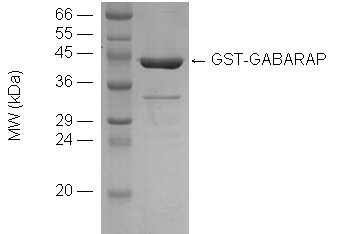Autophagy is a highly conserved bulk protein degradation pathway responsible for the turnover of long-lived proteins, disposal of damaged organelles, and clearance of aggregate-prone proteins. Autophagy is involved in various physiological or pathological processes, such as development, host defense response, cancer and neuronal degenerative diseases. It involves concerted action of more than 20 specific autophagy (ATG) proteins that mediate the formation of a double-membrane vesicle, the autophagosome, which engulfs the substrate and delivers it to the lysosome for degradation.
Formation and expansion of the pre-autophagosomal structure in yeast requires the attachment of the ubiquitin-like protein ATG8 via its C-terminal glycine to the amino group of phosphatidylethanolamine (PE), enabling its anchoring to the isolation membrane of the autophagosome. In mammals, ATG8 is represented by at least seven related proteins that fall into two subgroups, LC3- and GABARAP-like proteins. The free and PE linked versions of these proteins are often referred to as LC3-I and LC3-II respectively.
Shipping: Available products typically ship within 24/48h, via priority shipping.
Do you need support? Contact Customer Service or Technical Support.
Online Account
Access or Create Your Account
| Regulatory Status |
RUO – Research Use Only |
|---|
Last modified: May 29, 2024
 Lab Essentials
Lab Essentials AMPIVIEW® RNA probes
AMPIVIEW® RNA probes Enabling Your Projects
Enabling Your Projects  GMP Services
GMP Services Bulk Solutions
Bulk Solutions Research Travel Grant
Research Travel Grant Have You Published Using an Enzo Product?
Have You Published Using an Enzo Product?

